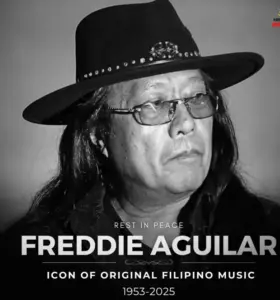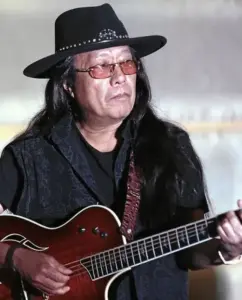
The Philippine music industry has lost one of its most powerful voices. On May 27, 2025, the legendary Freddie Aguilar passed away at the Philippine Heart Center Hospital at the age of 72. Known for his heartfelt lyrics, nationalist spirit, and the world-renowned song “Anak,” Freddie Aguilar leaves behind a legacy that transcends generations and borders.
This article is a tribute to a man whose music spoke of love, pain, social justice, and patriotism—a true icon of Original Pilipino Music (OPM).
Early Life and Musical Beginnings
Born as Ferdinand Pascual Aguilar on February 5, 1953, in Isabela, Freddie Aguilar showed an early interest in music. He picked up the guitar at the age of nine and was heavily influenced by folk and rock genres, listening to the likes of Bob Dylan, Cat Stevens, and local folk artists. Despite studying electrical engineering in college, his heart was set on music.
He left school early to pursue his passion, busking in Manila and composing songs that told stories of ordinary Filipinos. These formative years shaped the artist he would become—grounded, soulful, and driven by a deep love for his country and people.

The Song That Changed Everything: “Anak”
In 1978, Freddie Aguilar wrote and released “Anak”—a poignant ballad about parental love, regret, and redemption. Inspired by his own experiences, the song struck a universal chord, resonating with listeners across age groups and cultures. It tells the story of a wayward child who strays from the values taught by his parents, only to later seek forgiveness.
“Anak” became the best-selling Philippine song of all time and was translated into over 20 languages. It topped music charts not just in the Philippines, but also in countries like Japan, Germany, and Indonesia. It was more than just a hit—it was a global anthem of familial love and reconciliation.
“The success of ‘Anak’ wasn’t just about melody,” said one music critic. “It was about truth. Freddie Aguilar captured the heart of every Filipino family.”
Voice of the People: Activism Through Music
Freddie Aguilar was never afraid to use his voice for causes bigger than himself. In the 1980s, during the height of political unrest under the Marcos regime, Aguilar became known for singing songs that spoke of injustice, corruption, and the struggles of ordinary citizens.
One of his most powerful songs during this time was “Bayan Ko”, a patriotic anthem that became synonymous with the EDSA People Power Revolution. Though not his original composition, Aguilar’s rendition of “Bayan Ko” breathed new life into the song, turning it into a protest hymn for democracy and freedom.
He also released tracks like “Magdalena” and “Mindanao”, which highlighted the plight of women and marginalized communities in conflict-ridden areas.
Through his music, Freddie Aguilar became more than a singer—he became a movement.
A Career Spanning Five Decades
Throughout his career, Freddie Aguilar released more than a dozen albums and countless singles. Some of his notable works include:
- “Estudyante Blues” – A humorous yet eye-opening take on the educational system.
- “Ipaglalaban Ko” – A song of resilience and defiance against injustice.
- “Katarungan” – A plea for justice for the oppressed.
His ability to blend traditional Filipino instruments with Western folk influences gave his music a distinctive sound that remains unmatched. He was also one of the few Filipino artists to successfully bring OPM to international audiences without compromising cultural authenticity.
Global Recognition and Influence
Freddie Aguilar’s music was celebrated not only in the Philippines but around the world. He performed in international music festivals across Asia, Europe, and North America, representing Filipino artistry on a global stage.
“Anak” became an international success, charting in multiple countries and selling millions of copies. In 1981, he performed the song at the Tokyo Music Festival, receiving standing ovations and accolades from critics and fellow musicians.
Even decades later, his songs are studied in schools, covered by artists, and used in films, documentaries, and even advertisements.
Personal Life and Challenges
While Freddie Aguilar enjoyed massive success, his life was not without controversy and personal trials. He openly discussed his rebellious youth, his estrangement from his family during his early years, and later, his return home seeking forgiveness—events that shaped “Anak.”
He also faced criticism in his later years, particularly around his controversial marriage to a much younger woman. Despite the scrutiny, Aguilar remained unapologetically himself, continuing to perform and create music that stayed true to his beliefs and experiences.
Later Years and Final Performances
In his later years, Aguilar continued to perform in concerts and advocacy events. He remained a strong supporter of Filipino nationalism, often speaking out about the importance of preserving Filipino identity and culture.
In 2020, during the height of the COVID-19 pandemic, Freddie Aguilar went live on social media to sing songs of hope and resilience. Despite health concerns, he continued to perform when he could and attended musical events supporting local artists.
His last public performance was in early 2025, where he sang “Anak” at a cultural heritage concert in Manila. The crowd sang with him—many with tears in their eyes—perhaps unknowingly witnessing the final bow of a legend.
The Nation Mourns: Reactions to His Passing
News of Freddie Aguilar’s passing on May 27, 2025, sent shockwaves across the country. Tributes poured in from fellow musicians, public officials, and fans both old and new.
- President Ferdinand Marcos Jr. released an official statement, calling Aguilar “a national treasure whose music awakened the spirit of a generation.”
- OPM artists such as Gary Valenciano, Lea Salonga, and Ebe Dancel paid tribute by performing renditions of his songs online.
Social media was flooded with messages of thanks, remembrance, and nostalgia, with hashtags like #SalamatKaFreddie, #PaalamFreddieAguilar, and #OPMLegend trending nationwide.
A Legacy That Lives On
Freddie Aguilar’s death marks the end of an era—but not the end of his influence. His music lives on in playlists, school songbooks, karaoke bars, and hearts of Filipinos around the world.
New generations will continue to hear “Anak” and feel the same emotional pull that generations before them felt. His songs will continue to be sung in rallies, remembered in tributes, and studied by aspiring artists.
His ability to capture the Filipino soul—its struggles, hopes, dreams, and love for family—makes Freddie Aguilar not just a musician, but a national artist in every sense of the word.
Final Words
Freddie Aguilar was more than a singer-songwriter. He was a storyteller, an activist, a cultural icon, and a voice of truth. As we mourn his passing, we also celebrate a life well-lived and a legacy that will echo through the generations.
“Music is a weapon for change,” Freddie once said. And indeed, he used it like no other.
Paalam, Ka Freddie. Maraming salamat sa musika, sa aral, at sa pagmamahal sa bayan.🕊️ May your soul find peace, and may your songs continue to inspire long after your final note has played.
You May Also Visit:

